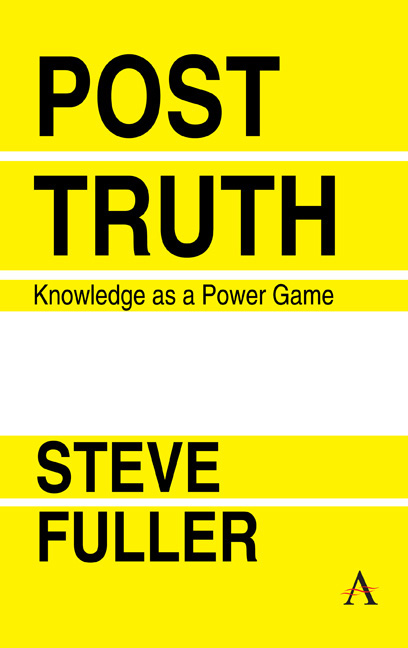Book contents
- Frontmatter
- Dedication
- Contents
- Acknowledgements
- Introduction: Science and Politics in a Post-Truth Era: Pareto's Hidden Hand
- 1 Brexit: Political Expertise Confronts the Will of the People
- 2 What Philosophy Does and Does Not Teach Us about the Post-Truth Condition
- 3 Sociology and Science and Technology Studies as Post-Truth Sciences
- 4 The Post-Truth about Academia: Undiscovered Public Knowledge
- 5 Science Customization: A Project for the Post-Truth Condition
- 6 The Performance of Politics and Science on the Playing Field of Time
- 7 Forecasting: The Future as the Post-Truth Playground
- The Argument in a Nutshell
- Glossary
- References
- Index
The Argument in a Nutshell
Published online by Cambridge University Press: 14 July 2018
- Frontmatter
- Dedication
- Contents
- Acknowledgements
- Introduction: Science and Politics in a Post-Truth Era: Pareto's Hidden Hand
- 1 Brexit: Political Expertise Confronts the Will of the People
- 2 What Philosophy Does and Does Not Teach Us about the Post-Truth Condition
- 3 Sociology and Science and Technology Studies as Post-Truth Sciences
- 4 The Post-Truth about Academia: Undiscovered Public Knowledge
- 5 Science Customization: A Project for the Post-Truth Condition
- 6 The Performance of Politics and Science on the Playing Field of Time
- 7 Forecasting: The Future as the Post-Truth Playground
- The Argument in a Nutshell
- Glossary
- References
- Index
Summary
The post-truth condition is not simply a product of our times but endemic to the history of Western thought, as originally expressed in the Platonic Dialogues. Moreover, post-truth is not a condition limited to politics but extends to science as well. Indeed, the post-truth condition enables us to see more clearly the complementarity of politics and science as spheres of thought and action. Each in its own way is involved in a struggle for ‘modal power’, namely, control over what is possible.
This book explores the field of play common to politics and science through such concepts as the ‘military- industrial will to knowledge’, ‘Protscience’ and ‘precipitatory governance’. What makes these concepts ‘post-truth’ is their refusal to take the rules of the epistemic game at face value. There is more to knowledge than the consensus of expert opinion, and even what the experts take as knowledge need not be interpreted as the experts would wish.
While some have decried recent post-truth campaigns that resulted in victory for Brexit and Trump as ‘anti- intellectual’ populism, they are better seen as the growth pains of a maturing democratic intelligence, to which the experts will need to adjust over time. The lines of intellectual descent that have characterized disciplinary knowledge formation in the academy might come to be seen as the last stand of a political economy based on rent- seeking, whereby credentials are seen more as arresting than facilitating the circulation of knowledge in society.
One need not pronounce on the specific fates of, say, Brexit or Trump to see that the post-truth condition is here to stay. The post-truth disrespect for established authority is ultimately offset by its conceptual openness to previously ignored people and their ideas. They are encouraged to come to the fore and prove themselves on this expanded field of play. In this respect the posttruth condition marks a triumph of democracy over elitism, albeit one that potentially tilts the balance towards ‘chaos’ over ‘order’.
Plato had realized that the only way to curb democracy's chaotic tendencies was to ensure that discussions about the rules of the game and one's position in the game are kept separate – what logicians have respectively called ‘first- order’ and ‘second- order’ questions.
- Type
- Chapter
- Information
- Post-TruthKnowledge as a Power Game, pp. 181 - 182Publisher: Anthem PressPrint publication year: 2018

